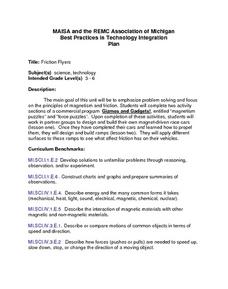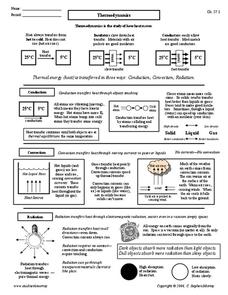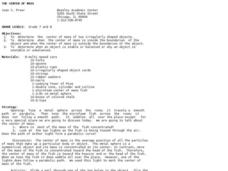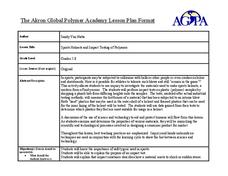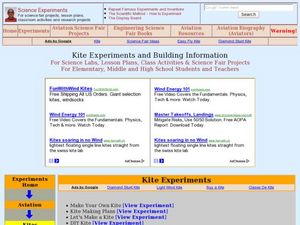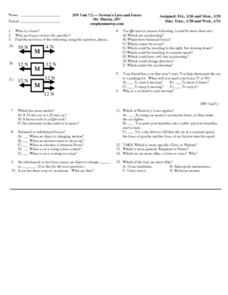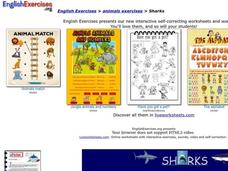Curated OER
The Universe
Students describe what scientists mean by an "expanding universe" in their own words. They explain how scientists comprehend the universie is expanding. Students comprehend the vast scale of the universe. They comprehend how theory...
Curated OER
F = a, Inertia, and Friction
Fourth graders use a matchbox car to push across a hard surface and observe what happens. They then push the car across a soft or rough surface and discover what happens. The two ideas are discusses as Newton's First and Second Laws of...
Curated OER
Periodic Table of the Elements: Noble Gases
Students research how neon signs are made and design their own. In this periodic table lesson, students familiarize themselves with the noble gases on the periodic table. They watch a video, research how neon signs are made, and design...
Curated OER
The Physics of Hummingbirds: Magic in the Air
High schoolers study hummingbirds and how they use Newton's law. In this motion lesson students complete several activities and view videos of hummingbirds.
Curated OER
Friction Flyers
Students explore the principles of magnetism and friction. They complete an interactive puzzle on the Gizmos and Gadgets computer software, construct a vehicle, build and modify ramps and vehicles to produce various outcomes, and...
Curated OER
Thermodynamics
In this thermodynamics worksheet, students learn about insulators and conductors. Students compare the three ways thermal energy is transferred: conduction, convection, and radiation. This worksheet has 22 matching, 1 multiple choice, 3...
Curated OER
Enzyme Lab
Students investigate the enzyme catalase. In this enzyme lesson plan, students observe a normal catalase reaction, they observe liver tissue, potato, chicken and apple for the enzyme catalase and they study the effects of temperature and...
Curated OER
Waves
In this waves activity, learners read about harmonic and linear motion in waves as well as the two types of waves. They match 5 terms to their definitions about the structure of waves, they solve for the wavelength, frequency and periods...
Curated OER
Thermodynamics
In this thermodynamics worksheet, students read about conduction, convection and radiation. They answer 47 questions about heat transfer, thermal equilibrium, insulators, conductors and the states of matter.
Curated OER
The Center of Mass
Students determine the center of mass of two irregularly shaped objects, determine when the center of mass is inside or outside the boundaries of the object, determine when and/or why an object is stable, balanced, unstable or unbalanced.
Curated OER
Sun, Sand, and Hippos
Students conduct research on varied aspects of hippopotamuses and in doing so, synthesize and evaluate a variety of information sources.They summarize content knowledge from varied resources and apply this knowledge by creating a mural...
Curated OER
Solar Racing
High schoolers harness the power of the sun to design, construct and evaluate a solar-powered model car of their creation. They race their cars in a "Solar Sprint" race modeled after the National Renewable Energy Laboratory's Junior...
Curated OER
Sucking Students into an Understanding of Air Pressure and Vacuums
Students develop and test their ideas about air pressure and vacuums by conducting several investigations into the movement of fluids in tubes.
Curated OER
Sports Helmets and Impact Testing of Polymers
Learners examine the importance of good quality safety gear. In this investigative lesson, students will tests various polymers, collect data, and analyze the data to determine which polymer is best for safety helmets. They will design a...
Curated OER
Kite Experiments and Building Information
Students build their own kite following certain procedures. In this physics lesson, students explain the aerodynamics concepts involved in flying kites. They trace the development of aviation.
Curated OER
Matter for Minors
Students use streaming videos, web sites, and hands on activities students to explore matter. They focus on how temperature affects matter and what the particles look like in the states of matter.
Curated OER
Sound
Fifth graders explore and examine the basic properties of sound. In pairs, they speak through a balloon and listen to the sound vibrations, and listen to a ticking clock or watch through a variety of materials and identify the...
Curated OER
Choosing Materials for Bicycle Frames
In this materials for bicycle frames worksheet, students read about the various materials that have been used to construct bicycles and the pros and cons of each. They answer four critical thinking questions about the reading and bicycle...
Curated OER
Newton's Laws and Forces
In this Newton's laws and forces worksheet, high schoolers answer 11 questions about inertia, vectors, force, and acceleration using Newton's laws. They also answer 3 questions about classification of species.
Curated OER
Sharks
In this sharks instructional activity, learners watch shark videos, answer multiple choice questions, fill in the blanks, write characteristics, and more. Students complete 11 activities.
Curated OER
Bellwork for Week 19-Electromagnetic Spectrum and Planets
In this bellwork on the electromagnetic spectrum and planets activity, students answer questions about the information determined using a spectroscope, the geocentric and heliocentric models of planet rotation and the planets.
Curated OER
Hello, Anybody Out There?
Students understand that people believe there may be life in other solar systems. In this communication with other solar systems lesson plan, students analyze our planet and write things they want to communicate to other solar systems.
Curated OER
Physics and the Quantum Mechanical Model
In this physics worksheet, students review vocabulary terms and key equations associated with the quantum mechanical model. Students apply the quantum theory to explain the photoelectric effect. This worksheet has 5 true or false, 12...
Curated OER
Radio Waves
In this radio waves worksheet, students read about how broadcasting uses radio waves to deliver sound and how radio signals are received. Then students complete 3 short answer questions.






